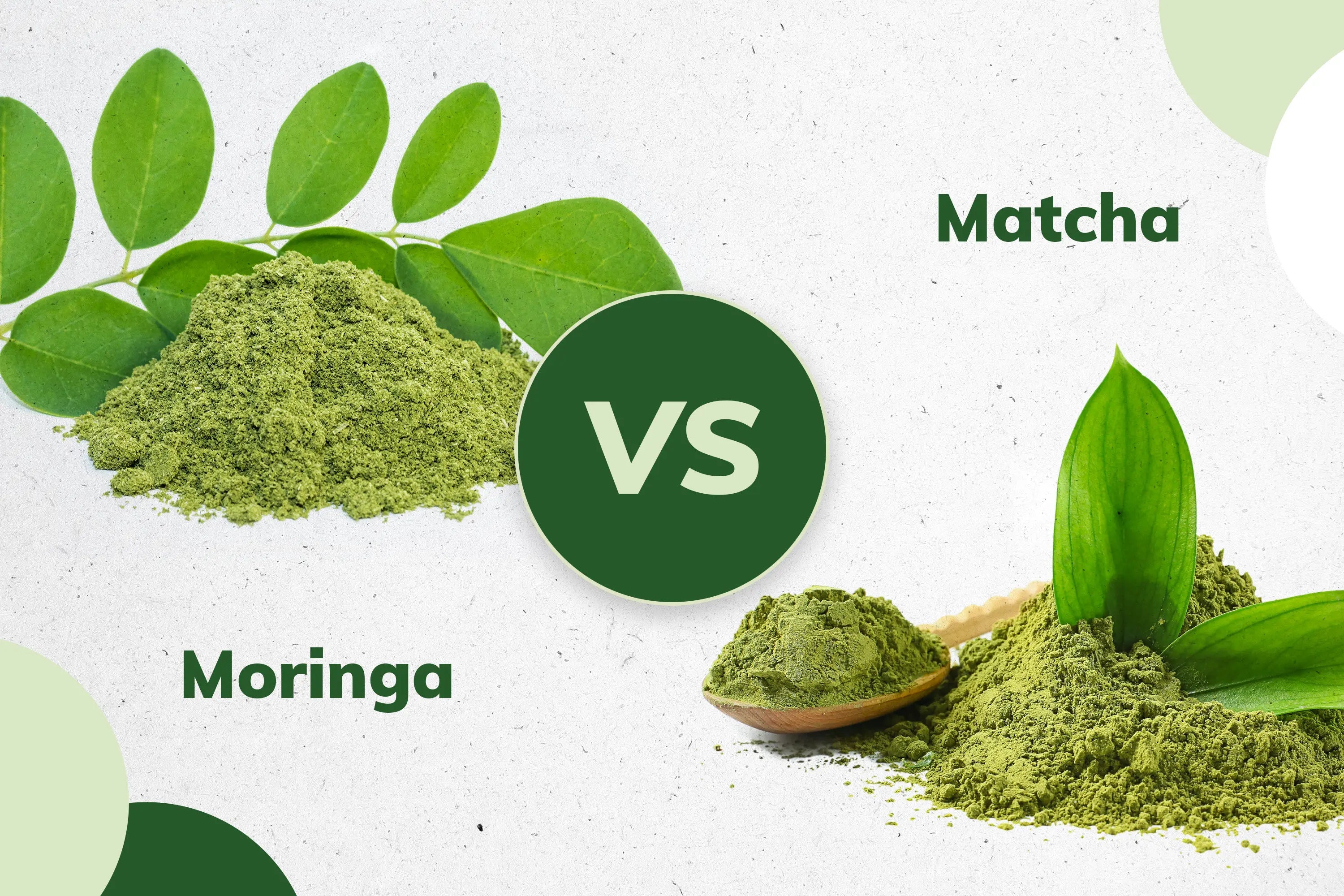If you’re searching for nutritional resources that have the potential to enhance your health, you may be trying to figure out whether to consume moringa or matcha to help you out. Both of these sources have indeed been utilised in medical approaches throughout history to assist with various health problems – so how do you know which one you should pick?
In this article, we’ll discuss what moringa and matcha are, their similarities and differences, and how you should pick the right resource for you today!
What are moringa and matcha?
Let’s start with moringa. Moringa refers to a plant which originates from Africa and Asia. Commonly utilized as a nutritional supplement, the moringa tree leaves, pods, and seeds are edible. Thus, it’s not unusual for moringa, particularly its leaves, to be added to mealtime dishes, hot teas, and smoothies.

On the other hand, matcha describes powdered green tea, which has fascinating Japanese tea ceremony origins. Constructed from the fine powder of green tea leaves, matcha tea plants are shade-grown for a few weeks before being harvested, making the green colour more prominent. It has become increasingly popular all over the world due to its striking, unique taste and possible health advantages.
Moringa vs matcha: how are they similar?
Moringa and matcha are both plant-based products which offer various possible health benefits and nutrients. With plenty of minerals, vitamins, and antioxidants, both sources could help contribute to a healthy diet and anti-inflammatory effects.
Furthermore, both plants are high in antioxidants. Antioxidants are compounds that neutralize free radicals, thus eliminating cell and tissue damage to improve our overall well-being. Matcha comprises catechins, while moringa has chlorogenic acid, quercetin, and beta-carotene.
Finally, both moringa and matcha are known for their versatility. They can both be added to food and drink, including smoothies, savory dishes, and desserts, making them easy to experiment with. Also check out moringa benefits for men.
Moringa vs matcha: what’s the difference?
While moringa and matcha have striking similarities, they also have some critical differences. Take a look at how they differ below – this may sway your decision on which one you want to add to your diet.
- Caffeine content
The fact remains that while moringa is naturally caffeine-free, matcha includes caffeine because of its green tea origins. This means that if you already have too much caffeine in your diet, want to cut down on it, or don’t respond well to it, you should choose moringa over matcha.

- Flavour
Moringa and matcha offer different tasting experiences. Moringa can be described as earthy, mild, and a little nutty. In contrast, matcha is known for its bitter and slightly sweet flavor, which links itself to the unique taste of green tea. So, the taste you like the best depends on your preference!
- Traditional usage
Moringa’s traditional usage lies in multiple cultures and is celebrated for its potential medicinal and nutritional benefits. On the other hand, matcha has been traditionally used in Japanese tea ceremonies, typically consumed as a green tea type. Therefore, if you are fascinated by Japanese history, trying matcha is the perfect first step in exploring it further.
- Construction
Moringa and matcha are made from different sources. Whilst moringa is constructed from moringa oleifera tree leaves, matcha comes from shade-grown green tea leaves in a finely powdered form.
Are there any side effects?
Both matcha and moringa are typically safe to take, but you should be aware of the potential side effects before consuming large doses of either of them.
Potential moringa side effects
- Interactions with other medications
- Digestive problems
- Allergic reactions
Potential matcha side effects
- Interactions with other medications
- Caffeine sensitivity, including restlessness, insomnia, and anxiety
- Stomach upset

As with any dietary resource, you should only consume matcha and moringa resources in moderation and be mindful of the potential side effects. If you experience any severe side effects after taking these supplements, you should stop using them and consult a medical professional or herbalist to discuss your next steps.
Conclusion
So, there you have it. Hopefully, after reading this blog, you are slightly more clued up on what moringa and matcha are, how they are different, and how they could help elevate your daily health and well-being. While these two sources share many similarities, their difference in striking tastes and caffeine content set them truly apart.
While both could benefit your everyday diet, choosing between moringa and matcha can be determined by a few factors. You should base your decision on your taste preferences, dietary requirements, and health objectives since each offers unique nutritional advantages.
If you’re still unsure which source to consume, speaking with a medical professional or herbalist could be beneficial to gain more advice on this topic. Whether you take moringa, matcha, or both, each could assist in boosting your daily well-being and enhancing your life!




Share:
What Are Mushroom Benefits for Men and Their Wellness?
Elderberry Benefits for Infants: A Natural Boost for Little Ones